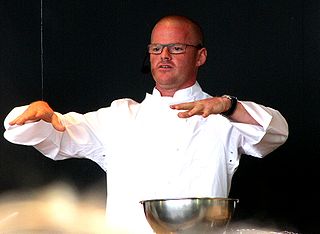A Quote by Heston Blumenthal
You think about some of the most memorable meals you've ever had; the food will be good but it will often be about locating a mental memory and taste is inexorably linked to all the other senses and memory, so ultimately it is all about taste.
Related Quotes
Think about food on a full stomach and you find you don't care about taste. Think of lust after making love, and you find you don't care about sex. Therefore, if people always reflect on the regret they will feel afterward to forestall folly at the moment, they will be stable and will not err in action.
Public taste changes and the aesthetic of a culture changes over time, so the idea isn't to appeal to the aesthetic of the moment and what people will like right now; the idea is to somehow keep yourself in the public memory so that as taste evolves it will eventually come to embrace your thing. So, it's about writing to be remembered rather than writing to be liked.
A good taste in art feels the presence or the absence of merit; a just taste discriminates the degree--the poco piu and the poco meno. A good taste rejects faults; a just taste selects excellences. A good taste is often unconscious; a just taste is always conscious. A good taste may be lowered or spoilt; a just taste can only go on refining more and more.
So many people that we met had some sort of connection to the [Olympics] games. Some story about how they volunteered there, or some sort of memory of it. It still is in the cultural memory and identity of these cities as much as it is in the physical and architectural memory. It's where these two things overlap, I think, that we're trying to explore with the photos.
The discovery of the good taste of bad taste can be very liberating. The man who insists on high and serious pleasures is depriving himself of pleasure; he continually restricts what he can enjoy; in the constant exercise of his good taste he will eventually price himself out of the market, so to speak. Here Camp taste supervenes upon good taste as a daring and witty hedonism. It makes the man of good taste cheerful, where before he ran the risk of being chronically frustrated. It is good for the digestion.
Everyone has taste, yet it is more of a taboo subject than sex or money. The reason for this is simple: claims about your attitudes to or achievements in the carnal and financial arenas can be disputed only by your lover and your financial advisers, whereas by making statements about your taste you expose body and soul to terrible scrutiny. Taste is a merciless betrayer of social and cultural attitudes. Thus, while anybody will tell you as much (and perhaps more than) you want to know about their triumphs in bed and at the bank, it is taste that gets people's nerves tingling.








































